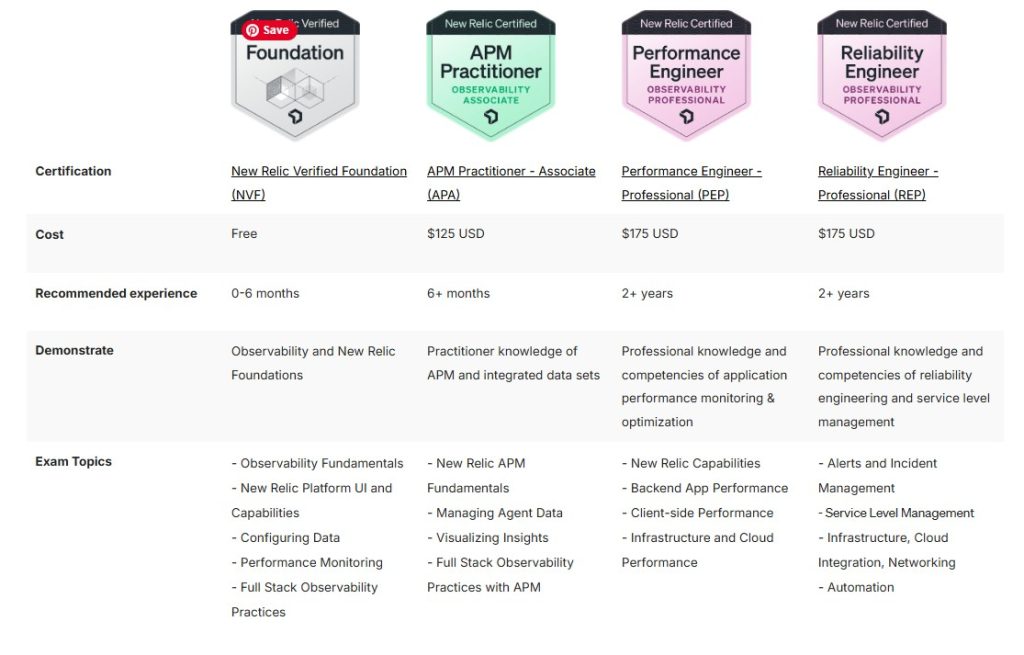Upgrade & Secure Your Future with DevOps, SRE, DevSecOps, MLOps!
We spend hours on Instagram and YouTube and waste money on coffee and fast food, but won’t spend 30 minutes a day learning skills to boost our careers.
Master in DevOps, SRE, DevSecOps & MLOps!
Learn from Guru Rajesh Kumar and double your salary in just one year.

Overview
The New Relic Certified Reliability Engineer – Professional (REP) certification is designed for professionals responsible for managing system uptime and reliability. This certification validates your proficiency in implementing New Relic observability solutions for scalable, complex, and distributed systems. By earning this certification, you demonstrate your ability to proactively track, monitor, and improve system reliability using the New Relic platform1.
As a certified REP professional, you will be equipped to ensure the smooth functioning of IT operations by maintaining uptime, reliability, and quality of user experience. This certification confirms your expertise in configuring and optimizing New Relic for proactive system monitoring and management1.
Topics & Agenda for 3 Days Training
Day 1: Alerting Fundamentals and Incident Management
Morning Session (9:00 AM – 12:30 PM)
- Introduction to New Relic Reliability Engineering
- Core principles of site reliability engineering
- The role of observability in reliability
- New Relic platform overview for reliability engineers
- New Relic Alert Concepts
- Understanding alert policies and their structure
- Types of alert conditions and their applications
- Incident management workflow
- Alert entity synthesis and correlation
- Lunch Break (12:30 PM – 1:30 PM)
Afternoon Session (1:30 PM – 5:00 PM)
- Custom Alert Policies and Conditions
- Creating effective alert policies
- Configuring NRQL alert conditions
- Setting up baseline and outlier detection alerts
- Implementing static threshold alerts
- Hands-on Lab: Alert Configuration
- Setting up alert policies for different scenarios
- Creating custom NRQL alert conditions
- Testing and validating alert functionality
Day 2: Service Level Management and Root Cause Analysis
Morning Session (9:00 AM – 12:30 PM)
- Notification Channels and Incident Workflows
- Configuring notification channels (email, Slack, PagerDuty, etc.)
- Setting up escalation paths
- Implementing on-call rotations
- Integrating with incident management systems
- Alert Quality Management
- Strategies for reducing alert noise
- Alert grouping and muting rules
- Implementing alert aggregation
- Alert effectiveness measurement
- Lunch Break (12:30 PM – 1:30 PM)
Afternoon Session (1:30 PM – 5:00 PM)
- Incident Post-mortem and Root Cause Analysis
- Structured approach to incident investigation
- Using New Relic data for root cause determination
- Creating effective post-mortem reports
- Implementing corrective actions
- Service Levels in New Relic
- Understanding SLIs, SLOs, and service level attainment
- Defining appropriate service boundaries
- Prioritizing SLOs based on business impact
- Implementing and tracking SLOs in New Relic
- Hands-on Lab: Service Level Implementation
- Creating SLIs and SLOs for sample applications
- Setting up service level dashboards
- Configuring SLO-based alerts
Day 3: Infrastructure Monitoring and Advanced Techniques
Morning Session (9:00 AM – 12:30 PM)
- Infrastructure Monitoring Strategies
- VM and containerized (Docker and K8s) workloads
- Serverless workload monitoring
- On-host integrations and common cloud integrations
- Advanced tuning of infrastructure agent
- Network Monitoring and Correlation
- Implementing network performance monitoring
- Correlating network issues with application performance
- Analyzing network dependencies
- Reducing MTTR through integrated monitoring
- Lunch Break (12:30 PM – 1:30 PM)
Afternoon Session (1:30 PM – 5:00 PM)
- Automation and API Integration
- Creating observability fixtures using New Relic APIs
- Implementing infrastructure as code with Terraform providers
- Automating dashboard and alert creation
- Building custom queries for improved insights
- Exam Preparation
- Review of key concepts
- Practice questions and scenarios
- Exam-taking strategies
- Final Q&A session
- Hands-on Lab: Comprehensive Reliability Implementation
- End-to-end implementation of reliability monitoring
- Creating a complete observability solution
- Troubleshooting complex reliability scenarios
Audience
This training program is specifically designed for:
- Site Reliability Engineers (SREs) responsible for system uptime and performance
- DevOps professionals managing application and infrastructure reliability
- IT Operations managers overseeing system reliability
- Platform engineers implementing observability solutions
- Technical leads responsible for service level objectives and reliability metrics
The ideal candidate should have two or more years of experience in performance analysis and site-reliability engineering using New Relic monitoring and performance management tools. Participants should also have experience with software development, systems monitoring, and infrastructure management1.
Trainer
Rajesh Kumar
Rajesh Kumar is a Principal DevOps Architect & Manager with over 15 years of extensive experience working with more than 8 software MNCs for software development, maintenance, and production environments. He has been involved in continuous improvement and automating entire life cycles using the latest DevOps tools and techniques from design and architecture through implementation, deployment, and successful operations2.
Rajesh is recognized as one of the top trainers for New Relic in India, with in-depth knowledge of the platform. He has conducted numerous New Relic training sessions and is available for both classroom and corporate training3. His expertise spans across various monitoring and observability tools, including New Relic, ELK, Splunk, and Nagios2.
Throughout his career, Rajesh has worked with prestigious organizations including ServiceNow, JDA Software, Intuit, Adobe Systems, IBM, Ness Technologies, MindTree, Accenture, and SurgeryPlanet2. He has successfully delivered New Relic training to various corporate clients, including L&T in February 20185 and Accenture in November 20215.
As an observability and monitoring expert, Rajesh brings practical insights and real-world experience to his training programs, making complex concepts accessible and applicable to everyday work scenarios4.
For more information about Rajesh Kumar and his expertise, visit: https://www.rajeshkumar.xyz/